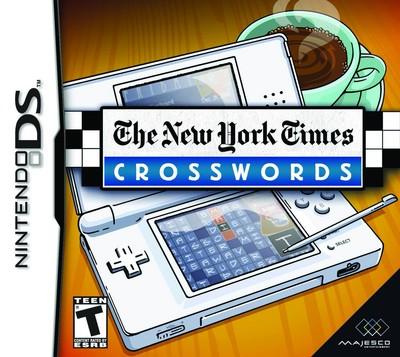Get a Clue

When I’m playing "The New York Times Crosswords" on Nintendo DS, I get the impression I am stupid.
"Crosswords" is really cool/dorky. I use a stylus pen to fill in some words, but the puzzles have more stumpers than a razed forest.
If you’re unaware, The New York Times prints mind-boggling crosswords. The clues are both vague and ambiguous, if that’s possible. Likewise, the DS game makes my head feel like a brain-leaking sieve.
A clue for one of the 1,000 puzzles in the game is "old-fashioned"; the answer to that riddle is "horseandbuggy." Really? I’m supposed to guess that?
Another clue suggests, "it might be 18 oz. on a cereal box"; this is somehow answered, "netwt," as in "net weight."
My eyes begin to hurt from concentrating. But I can’t stop playing "Crosswords." It’s fun, if you like the masochism. And you can play easily with other gamers.
Over Memorial Day weekend, my close friend Stephanie came over, and we played for hours on end, day after day. She’s from New York, and she’s familiar with the Times’ puzzler, so she was helpful/knew most of the answers.
But even clever Stephanie got frustrated as we limped along.
"Together, we’re smart," she said. "But separately, we’re idiots."
One thing that keeps me playing "Crosswords" is its potential to make my brain work better. A few studies have shown that tasking your brain with gaming complexities can sharpen your acuity, if only modestly.
Five years ago, researchers wrote in the Journal of the American Medical Association that older people can boost their cognitive functions if they engage their brains with intricate mental exercises.
I’m not an older person, but I found out months ago that my daily memory improved markedly by playing the math, logic and sudoku game, "Brain Age: Train Your Brain in Minutes a Day."
Similarly, I just finished playing "Crosswords" for the day, and long words keep flying into my brain while I write this review. I keep editing out those long words; I don’t want to get too flashy with my big dumb brain.
Fortunately, "Crosswords" does give me a choice to play easier puzzles (which are still harder than average crosswords). "Monday" puzzles are the simplest. Each day after Monday gets progressively tougher.
Sunday puzzles are ridiculous. Here’s a Sunday clue: "title village in a 1979 Francesco Rosi film." The answer: "Eboli." (I missed that.) There’s also, "nut taken directly from the freezer. " That’s a clue for "coldhardcashew." (Missed that, too.)
There is one saving grace for such brain twisters. Press a "hint" button on the DS, and the game fills in as many letters of an answer as you want. You could "hint" and cheat a whole puzzle or just the sticky spots to keep annoyance at bay.
And once you finish a puzzle, the game tells you which letters or words you got wrong, and you can try to fix them. Though, the more you "hint" and miss, the worse your grade. So far, I’ve earned a few A’s but also D’s — D as in "daft."
("The New York Times Crossword" retails for $30 for DS — Plays addictive. Looks fine. Challenging. Rated "T" for drug reference, mild language, mild suggestive themes. Three and one-half stars out of four.)
DOUG ELFMANMORE COLUMNSNEW IN STORES "Call of Juarez" is an Old West shooter from Ubisoft, the makers of "Tom Clancy" and "Prince of Persia" games. It retails for $60 for Xbox 360 and is rated "M" for blood, language, sexual themes and intense violence. "Planet Puzzle League" is Nintendo’s latest "Tetris"-ish puzzler. It retails for $30 for the DS and is rated "E." — By DOUG ELFMAN












